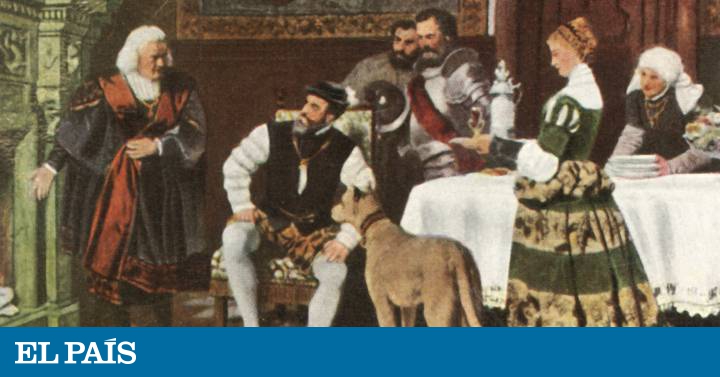In 1528, the crown of Spain had liquidity problems and decided to propose a deal to the bankers of Augsburg who imported it with overdue obligations.
MORE INFORMATION
- More from the author
Militiamen- Venezuela: anonymous optimists?
- Caparrós's question
The banker house was that of the Welsers. The Venezuelan schoolchildren — at least those of my generation — knew them as Belzares.
The Welsers, as bankers, were only seconds of the Fuggers, whom in the days of Austria, the Spaniards called Fúcares. Although the core business of the Welsers was financial, they were also shipowners who traded with Italian, Scandinavian and English threads, with oriental spices, medicinal plants, dyes, jewelry, furs, agricultural implements and household goods. They had large reeds in Madeira. Its network of factories and agents extended throughout the European continent.
Carlos V granted them for four years the occupation, government and usufruct of the territory that was already known as Venezuela. "Take cover of what you get out of that region and leave me alone," he told them.
Under the deal, the Crown gave up the right to introduce mares and horses to the country and exempted them from the salt tax. Nor would they pay for the almojarifazgo - the tariff on the introduction of manufactures - and they would have “free hold” to supply their ships in the atarazanas of Seville. He also gave them license to enslave all Aboriginal people who were rebellious. He authorized him to transport slaves of African origin to exploit the mines because that was what it was: to settle the debt with gold.
For the precious metals that ripped to the earth they would not pay the customary royal fifth but a tenth during the first 4 years. From then on, they would pay an ninth annual, then an eighth annual, and so on, until they reached the fifth law after ten years of exploitation. The Welsers obtained, in addition, the first contract for the trafficking of blacks in all the Indies - 4,000 slaves, just to begin with - concluded by Spain.
In exchange for all this, the Germans were forced to found cities, assemble ships and recruit 300 Spanish soldiers and 50 German miners who had to recognize the entire territory of the Indies that they could reach with their efforts. The German bankers were forced to build churches and favor Spanish missionaries as much as possible. According to Eduardo Arcila Farías, a great specialist in Venezuelan colonial economy, "the gold foundry, the main objective of the Belzares, showed in the first decade of the 16th century, the greatest benefits obtained by Spain throughout the Venezuelan colonial period." So the prospects in that 1528 were great.
As far as is known, the Welsers did not establish a single farmhouse. One of them, Nicolás de Federmann, enraged by greed, led an expedition - a predatory run, rather - from Coro, on the Venezuelan Caribbean coast, to the Bogotá plateau.
Another would attract about 100 men, including Germans, Spaniards and Creoles. They were led by Bartolomé Welser, a family offspring and reached the banks of the Casanare, in the western plains, but the company proved disastrous.
His people decimated by Aboriginal warriors and malarial fevers, Bartholomew returned to Chorus in early 1545, just in time to be judged by a ruler of the Spanish Royal Court that had been sent from Santo Domingo to order.
The four years of the initial agreement became almost 20 looting in the course of which Venezuela had a succession of German governors who often had convincing Spanish officials. The company, however, was not by far the business of the century. Shortly after, the Spaniards paid off Carlos V's debts and terminated the contract.
When I think of them - people like Ambrosio Alfinger, Nicolás Federmann, Georg Hohermuth and the unfortunate Felipe de Hutten, who died executed by the Spaniards in 1545 - I can't figure them out except as Klaus Kinski in Werner Herzog's Fitzcarraldo .
I find striking that, with everything and very willing to kick the territory in search of gold, they never thought of crossing the Orinoco to enter the Venezuelan Guiana. There is no milestone in my country that recalls the Welsers' passage through Venezuela, for them only surely a land of “arepa and casabe eaters,” as another predator called us, the tyrant Lope de Aguirre.
Looking back, and without anything other than the natural sympathy for every survivor of a commercial fiasco, I tend to look with good eyes at the Welsers, when I compare the snake bites and the poisoned arrows of the Guahibos of which they were victims with the Penguin profits from Russian, Iranian and Turkish factory companies, from the Colombian ELN bosses, from Venezuelan generals of illegal mining and other bloody gold entrepreneurs to the south of the Orinoco, all partners of the unpunished Maduro family, and those who run today Much better luck than the bankers in Augsburg.
You can follow THE COUNTRY Opinion on Facebook, Twitter or subscribe here to the Newsletter.

